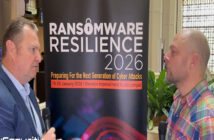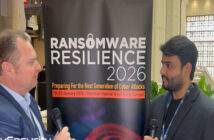 “Never be afraid to try something new. Remember, amateurs built the ark. Professionals built the Titanic.” (unknown).
“Never be afraid to try something new. Remember, amateurs built the ark. Professionals built the Titanic.” (unknown).
Dear Colleagues,
Welcome to the new look ASM. I’m Chris Cubbage, the new Editor. From this edition forward, ASM plans to become a publication of influence. Together with my awesome publishing team we’ll present the security industry as it should be – a professional, advanced and well established body that needs to be acknowledged for its diversity, expertise and fundamental disciplines.
Our intention is to keep you up-to-date and help keep your thinking at the cutting edge of security. We’ll address national issues and trends, regional developments, high-end technology, and the all important human face of security. Our articles will provide strategic, creative, how-to advice for those in the security profession and leading government, corporate, and private sectors.
As a new Editor and with many years experience in the field, I have many thoughts and experiences to share with you.
Fundamentally, if security is to stay ahead in dynamic world environments, operators need to be strategic, creative, and think laterally. But realistically, everyday we’re bombarded by information overload. So where do you access reliable, concise information? That’s where we come in. We’ll be right by your side. We’ll keep you up-to-date and keep your thinking current and at the cutting-edge of security trends.
If you’re new to MySecurity Media, ASM is supported with an annual publication, four security focused websites, weekly newsletters and daily social media interaction. All are designed to keep you informed up-to-the minute security news, views, innovations, and developments. In addition, MySecurity Australia’s Facebook page facilitates a daily flavour of discussions, commentary, news and events for our 3,000 plus audience. The sites project the industry as a proud, active group with similar objectives in common. That is a desire to raise standards, enhance professionalism and achieve balanced remuneration. Finally, the security industry has a voice.
Last month we surveyed over 2,800 Facebook fans with the question: ‘Are women recognised enough in the security industry?‘ Responses flooded in—all with a unanimous ‘NO!’ So as new Editor, I’m pleased to introduce our new Women in Security Series—one of a number of new features intended to deal with specific issues that recognise the efforts of others. After all, the professional diversity, experiences and expertise of operatives in the industry is the industry’s foundation. And one I believe needs to be explored and shared.
In many respects ASM has already achieved a reputation for its national and strategic security focus. However, due to recent developments in the global economy, I believe a broader scope is needed. So ASM will investigate the Asia Pacific region in more depth and examine more closely the Australian Security Industry and related government policy.
Security is fundamental and intricate to the human way of life. So where then is the Australian Security Industry? Where is it heading? How is it perceived by others and how does it perceive itself? With continued regional conflict directly influencing Australia’s security risk environment these are important questions. With a continuing convergence between physical and information security sectors, clarity is needed. With an emerging but slow shift in the representation of our national industry associations and regulatory framework—an objective voice needs to speak. And with sustained and rapid changes in security and communications technology, coupled with the frontline struggle to attract quality and enthusiastic young people across all security sectors—a resource such as ASM, focusing on training, development, safety and remuneration is well overdue. That’s why I plan for ASM is be all this and more.
The Australian Security Industry is a critical, multi-billion dollar industry with many operatives providing services throughout the Asia Pacific and the world. Yet, Australian security companies and professionals have to deal with eight different licensing and regulatory regimes—all with exclusion of the IT Security Sector. The question is why? A lot more harm can be done at the keyboard than at the front gate.
The licensing regimes we are dealing with are out dated. They were written for a world that existed 20 years ago, when I first joined the police force. Today, in the virtual world of security, there are no borders. So we certainly do not need 16 different licences to operate at a national level. Even the criminals realise this. So while we’re caught up in ‘faded’ licensing red tape, they’re technically savvy, internationally networked and able to cause more damage and mayhem with a computer or incessant device than ever before. The criminals have the advantage. Licensing and regulatory reforms are well overdue and critically important.
Currently, there is an opportunity to tailgate behind reforms in fighting national organised crime—as well as Occupational Safety and Health initiatives. I believe it is essential we get behind a national licensing and regulatory regime. Ideally, the national framework will be led and lobbied for by our national security associations—the collective with a common voice we so desperately need.
The recent resurgence in security related investments alone tells me ASM has its editorial finger on 2011’s pulse. Looking at anecdotal trends—the defence sector is expanding into civil and cyber security. A move I feel is likely to provide a boost to the profile and professionalism of the security industry. And one I would hope increases innovation as defence applications converge with civil security purposes.
Recent trends in the way state police and military forces are managing themselves also suggests a vocational shift. Personnel are moving over to a more lucrative, established and professional security industry. I know because I’m one of them.
To be effective, security needs to be one step ahead of criminals, terrorists, and global adversaries. Beyond 2012, the security industry will need to adapt and respond to rapid changes in technology. Areas such as the NBN, cyber security, public surveillance, robotics, biometrics, and integrated intelligent systems are becoming more commonplace as the technology itself becomes more affordable. That then raises the human issue—finding those qualified to deal with and train others in such high-end technology.
To reiterate, for security to stay ahead in this dynamic world environment operators need to be strategic, creative, and think laterally. We’ll keep you up-to-date and help keep your thinking at the cutting edge of security as we address national issues and trends, region developments, high-end technology, and the all important human face of security. Enjoy the ‘read’ as we take you on a journey exploring new horizons in security.
Yours Truly,
Chris Cubbage.





